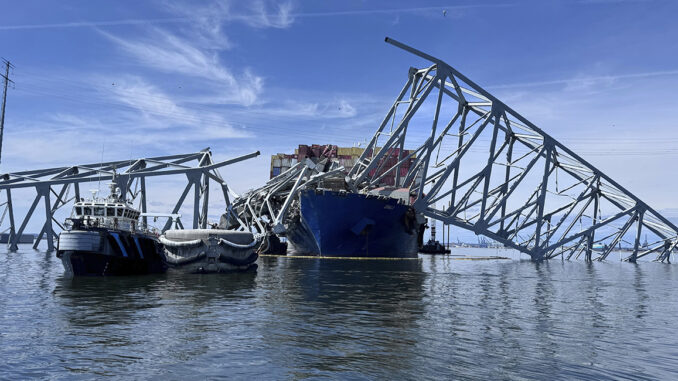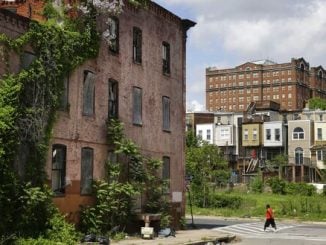
BALTIMORE — Maryland transportation leaders approved a contract for rebuilding the Francis Scott Key Bridge several months after the 1.6-mile steel span collapsed under the impact of a massive container ship that lost power and crashed into one of its supporting columns.
In the aftermath of the deadly March 26 collapse, officials quickly promised to rebuild the bridge — a longstanding Baltimore landmark and vital transportation infrastructure.
They cited a 2028 completion date and estimated the project would cost $1.7 billion. They also said it would include significantly more pier protection to better defend against future wayward ships.
At a monthly meeting last Thursday morning, the Maryland Transportation Authority board awarded Kiewit Infrastructure a $73 million contract for the project’s first phase. Kiewit calls itself “one of North America’s largest and most respected engineering and construction organizations.”
Bruce Gartner, executive director of the Maryland Transportation Authority, said the contract award signifies a big step forward in the recovery and rebuild process.
“This represents such an order of magnitude bigger than all our previous milestones,” he said in an interview Thursday. He said the agency hopes to release renderings of a preliminary design within the next few months, giving the public an idea of what the new bridge will look like.
According to its website, Kiewit was founded in 1884 to provide masonry services in Omaha, Nebraska. Its notable past projects include the Fort McHenry Tunnel under Baltimore’s harbor, which opened in 1985. More drivers have been using the tunnel since the bridge collapse eliminated one of three water crossings that allowed them to bypass downtown Baltimore.
Gartner said the state has worked with Kiewit before and that the company has managed the construction of major water crossings with maritime activity similar to the Key Bridge.
“We look forward to partnering with the Maryland Transportation Authority, many local subcontractors and suppliers, and our strong craft workforce to safely deliver and restore this vital transportation link in the city of Baltimore and the greater region,” the company said in a statement.
In announcing their recommendation to the board, state transportation officials said the company’s proposal was ranked first for its technical contents despite being somewhat more expensive than others.
Officials said the project will advance in two phases. The first will focus on the design work and other necessary steps before construction begins, which could include demolishing the remaining bridge pieces. Phase one is expected to be completed within a year.
Transportation officials said in a statement following the board meeting that Kiewit will have “exclusive negotiating rights” for the second phase. “If a guaranteed maximum price is not agreed upon, the MDTA will deliver the work under a separate contracting mechanism,” the statement read.
Officials have said the new bridge will be taller than the old one to accommodate ever-larger ships entering Baltimore’s harbor. The original Key Bridge took five years to construct and opened in 1977.
The March bridge collapse killed six members of a road work crew who were filling potholes on the bridge when it came crashing down into the water below. Baltimore’s busy port was closed for months after the collapse, and increased traffic congestion in the region remains a problem for drivers.
The FBI is investigating the circumstances leading to the collapse, including power outages experienced by the cargo ship Dali while it was docked in Baltimore.
The state transportation board also approved a proposal to remit the proceeds from a recent $350 million insurance payout to the federal government. Officials called the decision a show of good faith as discussions continue about whether the federal government will cover 100% of the cleanup and rebuilding costs. Chubb, the company that insured the bridge, paid the state $350 million this week.
Ongoing litigation will ultimately determine other liability assignments in the bridge collapse, which could become one of U.S. history’s most expensive maritime disasters.
Impacted businesses have joined Baltimore’s mayor and city council in filing claims, arguing the owner and manager of the Dali should have to pay damages. Underwood Energy, a Baltimore-based company that transports hazardous materials, filed a new claim Thursday based on revenue losses associated with the bridge collapse. Hazmat trucks are not allowed in two tunnels under the Baltimore harbor, so those vehicles “now must make a 30-mile detour to cross the Patapsco River,” the complaint says. Officials said they expect federal taxpayers to eventually be made whole for replacing the bridge, but that may take a while.



